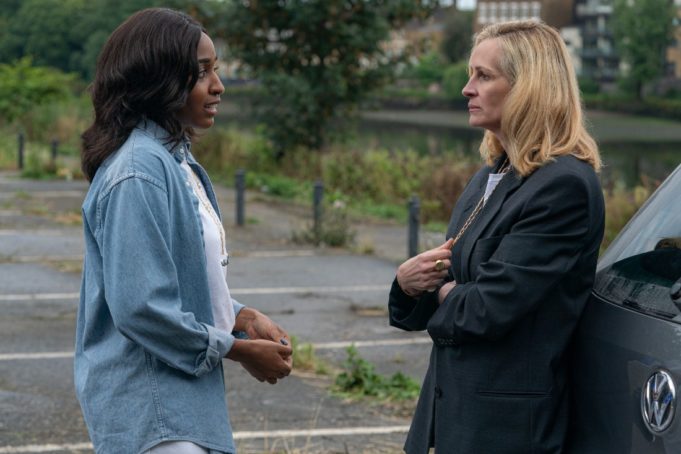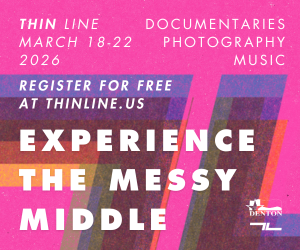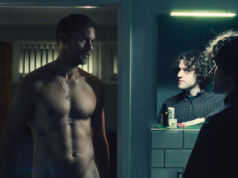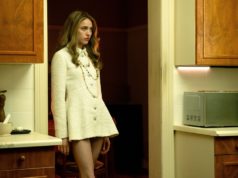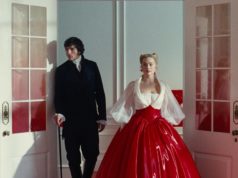When Luca Guadagnino’s After the Hunt played to a heavily polarized reception at last summer’s Cannes Film Festival, a fair number of people noticed that the movie used the “Woody Allen credit sequence,” with its opening credits playing as a series of plain white titles against a black background. The advantages of the Woody Allen credit sequence have little to do with the filmmaker. Opening credits like these are simple and direct, with no action or visuals to distract you from the names of the people who made the film. Far fewer people noticed that Eva Victor’s Sorry, Baby also used the Woody Allen credit sequence this past summer. That comparison doesn’t flatter the movie that opens this week, which is also about rape in a campus setting, and which has a lot more star power and a lot less to say.
Julia Roberts portrays Alma, an assistant professor of philosophy at Yale University who is up for tenure in 2019, at the same time as fellow assistant prof Hank (Andrew Garfield). They are quite chummy with each other regardless, but that changes the day Alma’s prize graduate student Maggie (Ayo Edebiri) tells Alma that Hank raped her after he escorted her home from a party at Alma’s house. Confronted by this — and, puzzlingly, while eating a massive pile of Indian food — Hank counter-accuses Maggie of fabricating the rape charge to get back at him after he found plagiarism in Maggie’s thesis about virtue ethics.
It’s so hard to get a handle on this story, you feel like you’re trying to hit a golf ball-sized piñata while you’re blindfolded and facing the wrong direction. (Then when you finally hit the thing, you find there’s only one candy in it.) Screenwriter Nora Garrett gins up the suspense by withholding information about Alma: why she keeps a bunch of old newspaper clippings in German, why she is so hostile to Maggie’s rape claim, and what health problems she is experiencing that leave her doubled over in pain and stealing prescription slips from doctors. Garrett does eventually reveal all this, but the multiple payoffs don’t add up to much. The final scene between Alma and Maggie after they’ve inflicted a world of hurt on each other leads to a reconciliation that feels unearned.
There is complexity here, too much for the filmmakers to handle. If none of the characters here are pristine, the movie doesn’t reap any of the benefits you’d expect from that. We’re told that other female students are Team Hank in the ensuing controversy, and we don’t see that in a meaningful way, or whether they rethink their position after Hank is fired and tells Alma’s entire class to go fuck themselves. Alma humiliates a student (Thaddea Graham) in her ethics seminar à la Lydia Tár, and that only serves to remind us that Todd Field’s drama was much better at depicting a heavily flawed woman caught up in a #MeToo scandal.
As for Maggie, the white filmmakers give equal weight to her claims that the system is rigged against her as a Black lesbian and to Hank’s complaints that he can’t get a fair shake as a straight white cisgender man. Alma’s psych professor friend (Chloë Sevigny) blasts the new generation of Yalies as a bunch of softies who fold up whenever they encounter the least bit of adversity, and while that yields a nice line (“What’s wrong with shoving it all down and then developing a debilitating substance abuse problem in your 30s like the rest of us?”), it doesn’t make for a trenchant comment on a culture where everyone feels like a victim.
This powerhouse cast might have made some sense of all this, but almost everyone here has been better elsewhere. If there’s one cast member who emerges from this with some credit, it’s Michael Stuhlbarg as Alma’s psychotherapist husband who, like his character in Call Me by Your Name, understands a great deal more than he lets on. He tells Alma that she’s been needlessly blaming herself for the adolescent trauma that’s been dictating much of her behavior, and it’s a powerful thing. (Good thing, too, because when Maggie tells Alma about the rape, he acts like a complete bastard, passive-aggressively saying that the women should be left to talk alone and then blasting samba music from the next room and repeatedly intruding on their conversation.) Had After the Hunt been constructed to make him and his speech the hook for the entire piece, that might have made it a good movie. Instead, its grander ambitions end up defeating its attempt to address a hot-button issue.
After the Hunt
Starring Julia Roberts, Ayo Edebiri, and Andrew Garfield. Directed by Luca Guadagnino. Written by Nora Garrett. Rated R.



